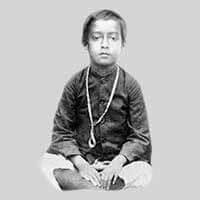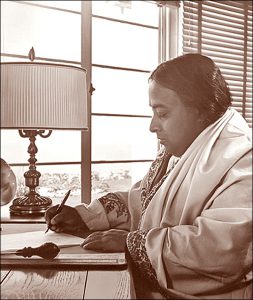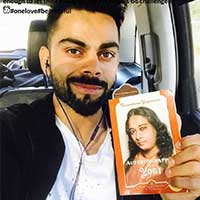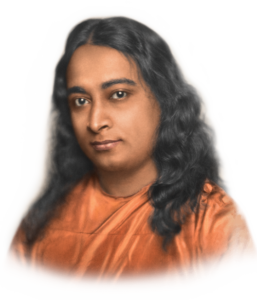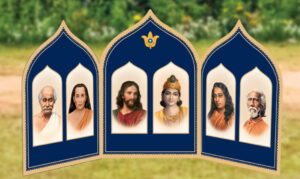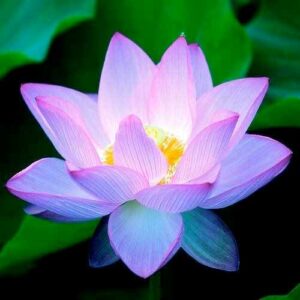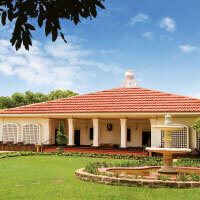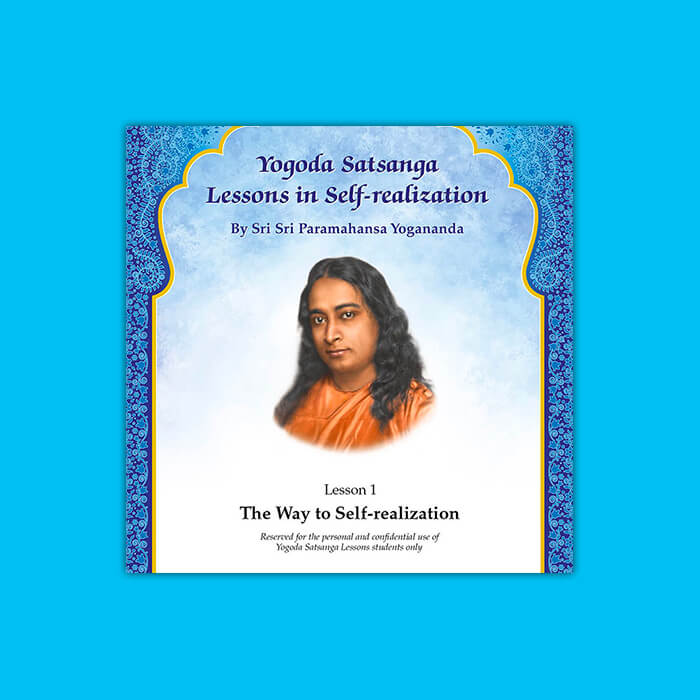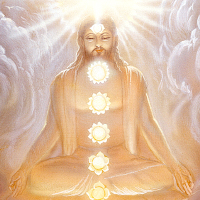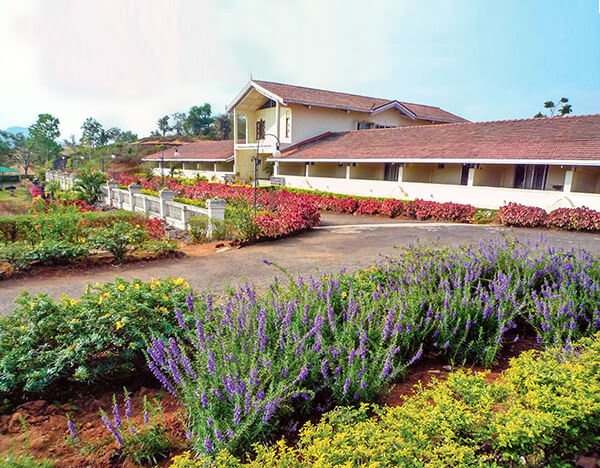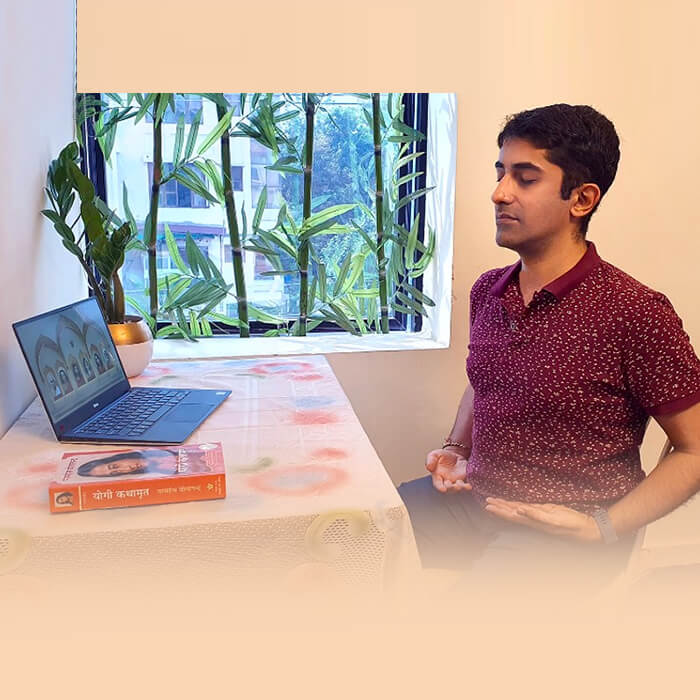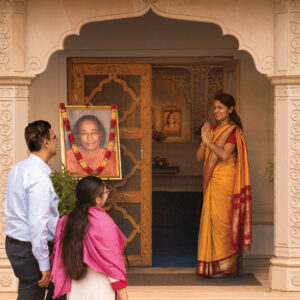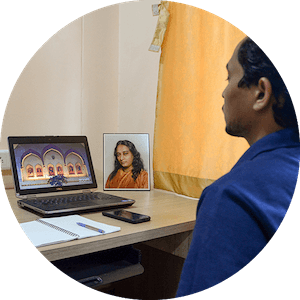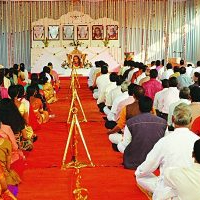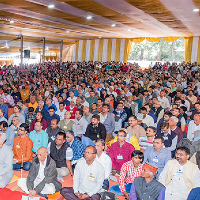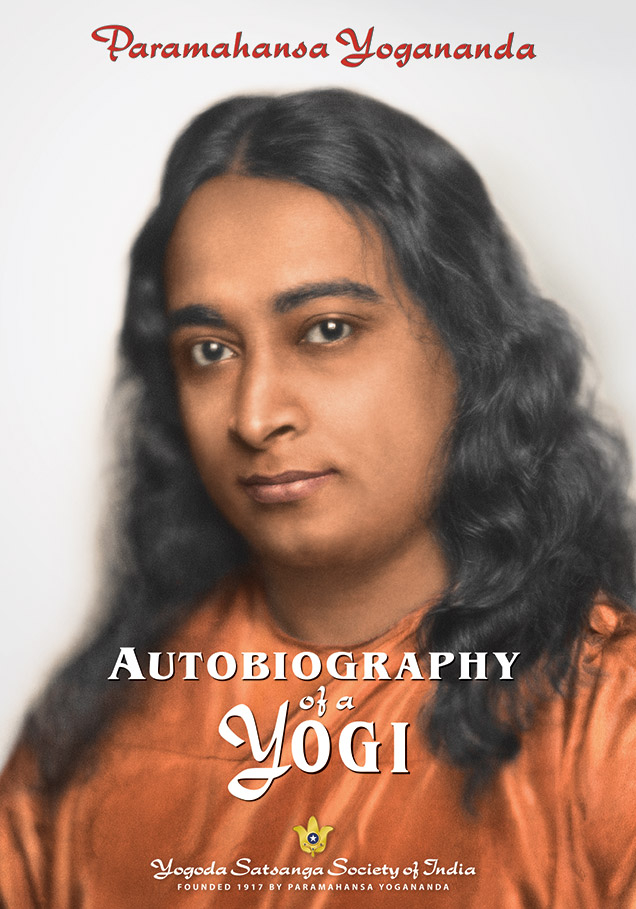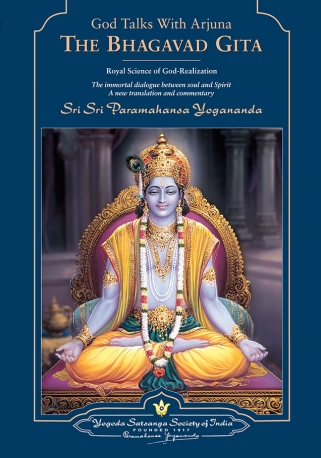
Paramahansa Yogananda — As I Knew Him,
By Sri Daya Mata
From her book Finding the Joy Within You:
Personal Counsel for God-Centred Living
As the years roll by, the mind gathers new experiences while time generally dims the memory of those long past. But events that touch the soul never fade; they become an ever-living, vibrant part of our being. Such was my meeting with my guru, Paramahansa Yogananda.
I was a young girl of seventeen, and life seemed to me one long empty corridor leading nowhere. An unceasing prayer to God revolved within my consciousness for Him to guide my steps to some purposeful existence in which I could seek and serve Him.
The answer to that yearning came in an instantaneous realization when in 1931 I entered the large, crowded auditorium in Salt Lake City and saw Paramahansaji standing on the platform, speaking of God with an authority I had never before witnessed. I became absolutely transfixed — my breath, thoughts, time, seemed suspended. A loving, grateful recognition of the blessing pouring over my being brought with it an awareness of a deep conviction rising from within me: “This man loves God as I have always longed to love Him. He knows God. Him I shall follow.”
Upholding the Ideals of Honour and Integrity
I had a preconceived ideal of what a spiritual teacher ought to be. You might say I had in my mind’s eye fashioned a pedestal on which to enthrone such a person. In reverence I mentally placed my Guru there; and never in those many years I was privileged to be in his presence did he once, in character or deed, step down from that lofty height.
Although in our era integrity, honour, and idealism have seemingly vanished under a tidal wave of self-seeking, Gurudeva lived uncompromisingly by the eternal spiritual values, and kept them ever before the disciples’ vision. I am reminded of a time in 1931 when funds were urgently needed. During this period, the financial resources were so meager that the Guru and disciples subsisted on thin soup and bread, or totally fasted. The mortgage was due on the Mt. Washington property, our Mother Centre. Paramahansaji went to the home of the mortgage holder to ask her for an extension of time to meet the payment. This understanding woman graciously extended the deadline. Even so, it seemed impossible to gather the necessary funds in time.
Then one day a business promoter came to Gurudeva’s classes and became interested in his teachings. The man saw in the teachings not only their spiritual value, but a lucrative potential as well. “Let me take charge of promoting your society, and within a year I will put you on the map. You will have tens of thousands of students and will be rolling in dollars,” he promised Paramahansaji.
He outlined his plan for commercializing the sacred teachings. Gurudeva listened politely. It would indeed mean the end of his financial worries and would forestall the hardships he knew still faced him. But without a moment’s hesitation he thanked the man and replied, “Never! I will never use religion as a business. I will never compromise this work or my ideals for a few paltry dollars, no matter what the need!”
Two months later, while teaching in Kansas City, Missouri, he met his exalted disciple of many former lives, Rajarsi Janakananda, who was destined to play an important role in Self-Realization Fellowship. This great soul, embracing the Guru as his own divine teacher, and the Guru’s teachings as his everyday way of life, gave the funds with which to pay off the entire mortgage. Great was the rejoicing when, down by the Temple of Leaves at Mt. Washington, a bonfire was made and the mortgage thrown into the flames. Being very practical-minded, Gurudeva took the opportunity to roast potatoes among the embers. The devotees gathered around the bonfire with the Guru and enjoyed the potatoes while the mortgage continued to roast — until well done!
Assurance of the Divine Mother’s Presence
There are other incidents that stand out in my memory, and other aspects of Guruji’s divine strength. Feeling the weight of a growing organization with many disciples to feed, house, and support, and having a desire to be free of distractions from his single-hearted longing for unbroken communion with God, he fled to the desert in Arizona. There he remained in solitude, meditating and praying to his beloved Divine Mother for freedom from the burdens and distracting duties of organizational responsibilities. One night while he was meditating — “as though my heart would burst with such longing for Her response,” he said — She appeared to him and spoke these soothing words:
Dance of life or dance of death,
Know that these come from Me, and rejoice.
What more dost thou want, than that thou hast Me?
Joyously overcome with this assurance that his adored Divine Mother was ever with him, in the midst of life or death, he returned with peace and all-surrendering love in his heart to take up again the mission She had laid upon his shoulders.
Gurudeva had great spiritual powers, a natural manifestation in one who has God-realization. Paramahansaji explained such powers as simply the workings of higher laws. In the early days of his ministry he sometimes publicly demonstrated those laws to encourage the faith of a sceptical society. I was one of the many he healed instantaneously.
Gurudeva was to say in later years, “If I were to display the powers God has given me, I could draw thousands. But the path to God is not a circus. I gave the powers back to God, and I never use them unless He tells me to. My mission is to awaken love for God in the soul of man. I prefer a soul to a crowd, and I love crowds of souls.” Gurudeva withdrew from the masses and began to concentrate on qualitative rather than quantitative growth. He sought out in the crowds those “souls” who responded to the high ideals and spiritual goals of his teachings.
Service, Wisdom, and Divine Love
A newspaperman once asked me during an interview, “Would you say that Paramahansa Yogananda was a bhakti, jnana, or karma yogi?” I replied, “He was many-sided. It took one of such a nature, stature, and understanding to reach the hearts and minds of the American people. It enabled him to bridge the gap between life in India and life in America; his teachings express a universal quality, as applicable in the West as in the East.”
As a karma yogi, Paramahansaji worked for God and for the upliftment of mankind with a dedication rare in this world. We never saw him spare himself when he had an opportunity to serve or help another. He cried for those who suffered, and worked tirelessly to eradicate the root-cause of all suffering — ignorance.
As a jnani, his wisdom flowed forth in volumes through his writings, lectures, and personal counsel. His Autobiography of a Yogi has been acknowledged as an authoritative textbook on Yoga, and is used for both teaching and study in various courses in many colleges and universities. This is not to say that Paramahansaji was merely an intellectual. To him, intellectualism without realization was as worthless as a hive without honey. He stripped religion of its veils of dogma and theoretical analysis and revealed the heart of truth: those essential principles that give mankind not only an understanding of God, but the way to realize Him.
To his followers, Paramahansa Yogananda is known, above all, as a premavatar, incarnation of divine love, a supreme bhakta. Outstanding in his character was his overwhelming love for God, whom he reverenced as the Divine Mother. This, said Jesus, is the first commandment: “Thou shalt love the Lord thy God with all thy heart, and with all thy soul, and with all thy mind.” Paramahansaji demonstrated such love, whether he was speaking before multitudes, as witnessed in his early days in America; or administering to the worldwide needs of his growing Self-Realization Fellowship/Yogoda Satsanga Society; or guiding those who had come to him for spiritual training.
Paramahansaji was capable of great fire when spiritual discipline was called for, but always there was boundless compassion, and patience when patience was needed. Well do I recall his words to us when we became indignant over an attack by a few hostile critics of his work: “Never speak an unkind word against other teachers and societies. Never try to appear tall by chopping off the heads of others. There is enough room in this world for all, and we should respond to unkindness and hatred with goodness and love.”
He gave to the world a “Universal Prayer,” whose theme was the very heart of his life: “Beloved God, may Thy love shine forever on the sanctuary of my devotion, and may I be able to awaken Thy love in all hearts.”
“Only Love Can Take My Place”
Near the end of Gurudeva’s life, he was preparing to receive the Indian ambassador, Dr. Binay R. Sen (who was to come the following morning to visit Guruji at our Self-Realization headquarters). Guruji called the disciples into the ashram kitchen and said, “Today we will prepare curries and Indian sweetmeats for the ambassador.” We cooked all day long, and Guruji was in a state of great joy.
Late that evening, he called me to him and said, “Come, let us take a walk.” The ashram is a large three-story building. As we walked down the third-floor hall, he paused in front of a picture of his guru, Swami Sri Yukteswarji. He gazed at that picture for a long time — eyes unblinking. And then very quietly he turned to me and said: “Do you realize that it is just a matter of hours and I will be gone from this earth?” Tears flooded my eyes. Intuitively, I knew that what he said was to come to pass. A short time earlier, when he spoke to me of leaving his body, I had cried to him, “Master, you are the diamond in the ring of our hearts, and of your society. How can we carry on without you?” With such sweet love and compassion, his eyes like soft pools of divine bliss, he answered: “When I am gone, only love can take my place. Be so drunk with the love of God, that you will know nothing but God; and give that love to all.”
On the final day, he was to speak at a banquet for the ambassador in downtown Los Angeles. We who served him arose in the early dawn and went to his door to see if we could do anything for him. As we entered, he was sitting very quietly in the chair in which he frequently meditated and was often in ecstasy. When he didn’t want us to talk, he would put his finger to his lips, meaning, “I am in silence.” The moment he did that, I saw the withdrawal of his soul, that he was gradually severing each of the hidden ties that bind the soul to the body. Sorrow filled my heart, and yet strength too, because I knew that no matter what happened, through my devotion to him, my Guru would never leave my heart.
All day long he remained in that interiorized state. Toward evening, we went with him to the large hotel where the banquet was to be held. Arriving early, Guruji waited in a little room upstairs, quietly meditating. We disciples sat around him on the floor. After some time, he gazed at each of us in turn. I remember thinking, as he looked at me, “My beloved Guru is giving me a farewell darshan.” Then he went down to the banquet hall.
There was a large audience, which included city, state, and Government of India officials. I was sitting some distance from the speakers’ table, but my mind and gaze never left the blessed Guru’s face. Finally, the time came for him to speak. Gurudeva was the last to do so before Ambassador Sen was to address the gathering. As Guruji rose from his chair, my heart skipped a beat and I thought, “Oh, this is that moment!”
When he began speaking, with such love for God, the whole audience was like one person; no one stirred. They were transfixed by the tremendous force of love that he was pouring from his heart upon all of them. Many lives were changed that night — including some who later entered the ashram as monastics and many others who became members of the society — because of that divine experience. His last words were of the India he loved so much:
“Where Ganges, woods, Himalayan caves, and men dream God —
I am hallowed; my body touched that sod.”
As he uttered these words, he lifted his eyes to the Kutastha centre, and his body slumped to the floor. In an instant — our feet seemed not to touch the ground — two of us disciples [Daya Mata and Ananda Mata] were by his side. Thinking that he might have gone into samadhi, we softly chanted Aum in his right ear. (Over the years he had told us that when he went into ecstasy, if after some time his consciousness did not return we could bring him out of that state by chanting “Aum” in his right ear.)
As I was chanting, a miraculous experience took place. I do not know how to describe it to you, but as I knelt over my blessed Guru, I could see that his soul was leaving the body; and then a tremendous force entered my being. I say “tremendous” because it was an overwhelming blissful force of love, peace, and understanding. I remember thinking, “What is this?” My consciousness was lifted up in such a way that I could feel no sorrow, I could shed no tears; and it has been so from that day to this, because I know beyond any doubt that he is truly with me.
Death Had No Claim on Him
Someone has asked me, “Has our Guru appeared to you since he left his body?” Yes, he has. I will speak more of this as I continue my story. Thousands came to see Guruji’s mortal form for the last time. His skin was golden, as though bathed in a golden light; and the sweetest, most benign smile was on his lips, like a benediction on every one. For twenty-one days after Guruji left his body, that form remained in a state of perfect preservation. There was not the slightest sign of decay. And even in the very matter-of-fact western hemisphere, the newspapers were emblazoned with headlines and reports on this miraculous event. The morticians who observed his body stated that “the case of Paramahansa Yogananda is unique in our experience.”
Not long after that the full responsibility for leadership of Gurudeva’s work fell on my shoulders.
When a great teacher leaves this world, it often happens that some different opinions arise as to how the mission begun by the guru should be guided. Questions arose during discussion of the work on the morning after I became the leader. Should the guidance of the work be in the hands of the householders or monastics? Guruji had told us it was to be with single-hearted renunciants like himself; but that directive was being challenged by some of the members. True, Guruji’s love for all devotees was the same. I also felt no distinction; why be bound by externals? A devotee is a devotee because he loves God, not because he wears an ocher cloth. But my mind was troubled.
That night, I sought Guruji’s answer by meditating deeply and praying to him. It was very late and I was still meditating when suddenly I saw my body get up from the bed, walk down the hall, and enter Gurudeva’s room. As I did so, out of the corner of my eye I saw his chuddar (shawl), fluttering as though in a slight breeze. I turned, and there stood my Guru! With what joy I ran to him and knelt to take the dust of his feet, holding them close to me.
“Master, Master,” I cried, “you are not dead you are not gone! Death has no claim on you.” How sweetly then he reached down and touched me on the forehead. As he did so, in that instant I knew the answer I must give at the meeting the next morning. Guruji blessed me, and I saw myself once again sitting upon my bed.
The next morning, I met with the directors of the society, and gave the answer Guruji had conveyed to me; and his work has been united and growing and growing and growing, ever since. Such is the blessing of God.
The Ever-Living Guru
Paramahansa Yogananda will always be the Guru and supreme spiritual head of Self-Realization Fellowship/Yogoda Satsanga Society of India. All of us who carry on the work begun by him serve humbly as his disciples. Our only wish is to turn the attention and the devotion of all who come to this path toward God, and toward our divine Guru, who can introduce them to God. Gurudeva was always quick to remind us that in the ultimate sense, it is God alone who is the Guru. Gurudeva’s one wish, as an instrument of God, is to draw us to the Divine Source from which we can receive, as from none else, what our souls seek. To be loyal to Guru is to be loyal to God. To serve the Guru and his work is to serve God, because it is God to whom we give our first allegiance. Guru is the divinely appointed spiritual channel through whose blessings and inspired teachings we find our way back to God.
I used to think that it would be very hard for devotees to understand the guru-disciple relationship after the Master had gone from this earth plane. I never voiced this doubt to Guruji; but he often answered our unspoken thoughts. I was sitting at his feet one evening, when he said to me: “To those who think me near, I will be near. This body is nothing. If you are attached to this physical form, you will not be able to find me in my infinite form. But if you look beyond this body and see me as I truly am, then you will know that I am always with you.”
I did not fully comprehend the truth of that statement until some time later. One evening, while I was meditating, the thought came to me: Consider all of the disciples who gathered around Jesus Christ during the few years of his ministry on earth. Some thought much of him; some served him selflessly. But how many out of the crowds really understood and followed him all the way? During his great trial, and at the moment of his passing, how many stood beside him and supported him? Many who knew Jesus, and had the opportunity to follow him, forsook him during his lifetime. And yet, twelve hundred years after Jesus Christ had left this earth, there came a humble, sweet, simple devotee who, through his beautiful life and perfect attunement and communion with Christ, exemplified everything that Jesus had taught, and thereby found God. That humble little man was St. Francis of Assisi, whom Guruji loved so much. I realized that the same spiritual law by which St. Francis could be perfectly in tune with his guru, who had appeared on earth centuries before him, still works for us today.
A true God-appointed guru is ever living. He knows his own and helps them whether or not he is incarnate on the same plane as the disciple. All of those who strive to keep themselves in tune with Gurudeva through devotion and deep guru-given meditation will feel the assurance of his guidance, his blessings, as much today, or any time in the future, as when he was with us in physical form. This should be a great comfort to all who have come since Paramahansa Yogananda’s passing, and who lament that they did not have the opportunity to know this blessed one during his earthly incarnation: you can know him when you sit silently in meditation. Go deeper and deeper with your devotion and prayer, and you will feel his hallowed presence. If we who have been left to carry on in his stead did not realize and experience this, we would be helpless to serve his work. It is because we feel his blessings and guidance, because we know he is as near today as when he was with us in the fleshly form, that we have the strength, determination, enthusiasm, devotion, and conviction to do our part in spreading the message of Self-Realization Fellowship.
Paramahansaji’s life and work have already done much to influence the course of history, and I am convinced that this is only the beginning of that influence. He joins the conclave of divine souls who lived on earth as incarnations of the light of Truth to illumine the pathways of mankind. The world must sooner or later turn toward that light, for it is not the will of God that man should perish by the hand of his own ignorance. There is a better tomorrow, just waiting for mankind to open its eyes and see the dawn. Paramahansa Yogananda, and others who have reflected the Divine Brilliance, are the light bearers of that new day.
Order Now Finding the Joy Within You



